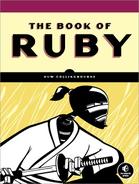When you need to take a variety of different actions based on the value of a single variable, multiple if..elsif tests are verbose and repetitive.
A neater alternative is provided by a case statement. This begins with the word case followed by the variable name to test. Then comes a series of when sections, each of which specifies a “trigger” value followed by some code.
This code executes only when the test variable equals the trigger value:
case.rb
case( i )
when 1 then puts("It's Monday" )
when 2 then puts("It's Tuesday" )
when 3 then puts("It's Wednesday" )
when 4 then puts("It's Thursday" )
when 5 then puts("It's Friday" )
when (6..7) then puts( "Yippee! It's the weekend! " )
else puts( "That's not a real day!" )
endconstants.rb
math_pi.rb
In the previous example, I’ve used the then keyword to separate each when test from the code to execute. In Ruby 1.8, just as with if tests mentioned earlier, you could use a colon as an alternative, but this syntax is not supported in Ruby 1.9:
when 1 : puts("It's Monday" ) # This works in Ruby 1.8 only!The then can be omitted if the test and the code to be executed are on separate lines. Unlike case statements in C-like languages, there is no need to enter a break keyword when a match is made in order to prevent execution trickling down through the remainder of the sections. In Ruby, once a match is made, the case statement exits:
case_break.rb
def showDay( i )
case( i )
when 5 then puts("It's Friday" )
puts("...nearly the weekend!")
when 6 then puts("It's Saturday!" )
# the following never executes
when 5 then puts( "It's Friday all over again!" )
end
end
showDay( 5 )
showDay( 6 )It's Friday ...nearly the weekend! It's Saturday!
You can include several lines of code between each when condition, and you can include multiple values separated by commas to trigger a single when block, like this:
when 6, 7 then puts( "Yippee! It's the weekend! " )
The condition in a case statement is not obliged to be a simple variable; it can be an expression like this:
case2.rb
case( i + 1 )
You can also use noninteger types such as a string. If multiple trigger values are specified in a when section, they may be of varying types—for example, both string and integers:
when 1, 'Monday', 'Mon' then puts( "Yup, '#{i}' is Monday" )Here is a longer example, illustrating some of the syntactical elements mentioned earlier:
case3.rb
case( i )
when 1 then puts("It's Monday" )
when 2 then puts("It's Tuesday" )
when 3 then puts("It's Wednesday" )
when 4 then puts("It's Thursday" )
when 5 then puts("It's Friday" )
puts("...nearly the weekend!")
when 6, 7
puts("It's Saturday!" ) if i == 6
puts("It's Sunday!" ) if i == 7
puts( "Yippee! It's the weekend! " )
# the following never executes
when 5 then puts( "It's Friday all over again!" )
else puts( "That's not a real day!" )
endAs mentioned earlier, the when tests on an object used in a case statement are performed using the === method. So, for example, just as the === method returns true when an integer forms part of a range, a when test returns true when an integer variable in a case statement forms part of a range expression:
when (6..7) then puts( "Yippee! It's the weekend! " )
If in doubt on the effect of the === method for a specific object, refer to the Ruby documentation on that object’s class. Ruby’s standard classes are documented in the core API here: http://www.ruby-doc.org/.
There is an alternative form of the case statement that is like a shorthand form of a series of if..then..else statements. Each when section can perform some arbitrary test and execute one or more lines of code. No case variable is required. Each when section returns a value that, just like a method, is the result of the last piece of code that’s evaluated. This value can be assigned to a variable preceding the case statement:
case4.rb
salary = 2000000
season = 'summer'
happy = case
when salary > 10000 && season == 'summer' then
puts( "Yes, I really am happy!" )
'Very happy'
when salary > 500000 && season == 'spring' then 'Pretty happy'
else puts( 'miserable' )
end
puts( happy ) #=> 'Very happy'